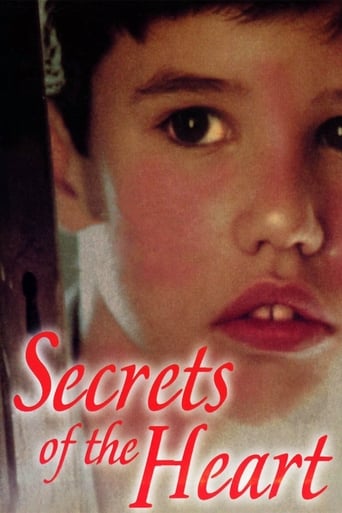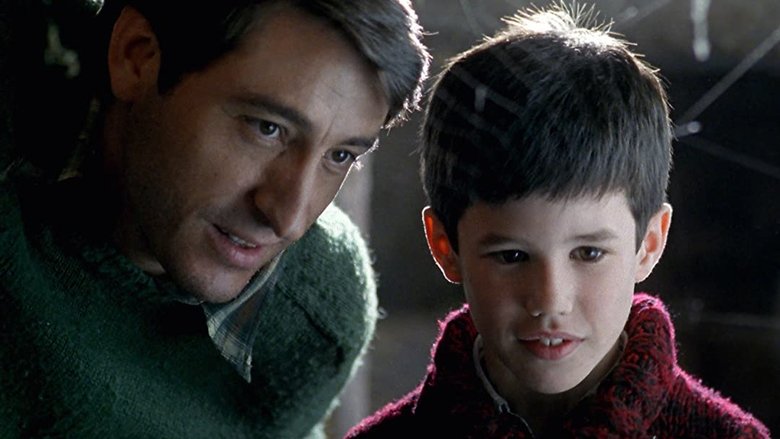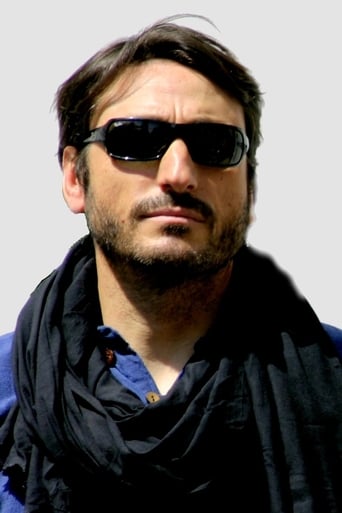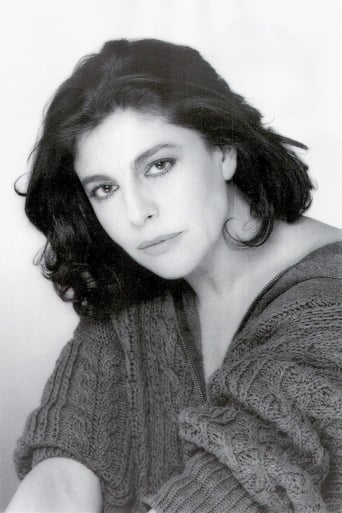

Secrets of the Heart (1997)
Javi and his friend Carlos visit an old house on the outskirts of a small Spanish village. According to his brother Juan this is a haunted house and one can hear the voices of the dead. Later he is intrigued with a room which is always closed (the room where his father was found dead). He is so interested in these mysteries that he starts to investigate all the secrets of these dead people and their stories.
Watch Trailer
Cast


Reviews
Sensational film that dispenses a brooding plot and considered to be one of the best Spanish films of the 90s , in fact was voted one of the best pictures by professionals and critics . Well directed film by Montxo Armendariz , including his own story and screenplay , who tried to create an agreeable flick plenty of sensitivity and metaphor by tackling a description about a particular and dysfunctional family formed by two spinster aunts (Charo Lopez , Vicky Peña) , an affected mother (Silvia Munt) , the brother-in-law (Carmelo Gomez) , the grandfather (Joan Valles) , but especially focusing the little boy (Andoni Erburu) and his brother . This is an intense as well as sensitive drama dealing with a little boy called Javi , a coming-of-age tale in which he discovers the sense of life about sex , family , freedom and love . This slow-moving and intelligent picture is well set in Spain of the 50s . Javi (Andoni Erburu) and his friend Carlos (Garces) visit an old house on the outskirts of a small Spanish village next to Pamplona . According to his brother Juan (Nagore) this is a haunted house and one can hear the voices of the dead . Later he is intrigued with a room which is always closed and his mom (Silvia Munt) prohibits it . He is so interested in these mysteries that exacerbate his ingenuity and imagination . As Javi begins to investigate all the secrets of these dead people , of his family and their stories , but he finds terrible trues . Sensitive film full of feeling , haunting mood-pieces , wonderful scenes and sense of wonder . Colorful picture , including marvelous frames , being mostly filmed at Tudela , Navarra and including sunny outdoor scenes . This extraordinary flick spells through intricate patterns of images , sets , sound and color . In addition , a magnificent support cast of known and prestigious players , such as Charo Lopez , Vicky Peña , Carmelo Gomez , Chete Lera , among others . His style is pretty much dry in the atmosphere as in the fresh dialog , as well as realistic , and including pleasant elements as when the family sings popular songs . "Secrets of the Heart" is one of Armendariz's undisputed masterpieces and fundamental in his filmography where shows efficiently an interesting story and shot at the height of his creativity , with some peculiar characters , as the main starring boy , his spinster aunts and the grudge grandfather . Splendid , luxurious photography with juicy atmosphere by Javier Aguirresarobe . Aguirresarobe subsequently would make a prestigious career in Hollywood such as ¨Fright night , ¨The twilight saga: eclipse¨, ¨The road¨ , ¨The others¨ and many others . Interesting screenplay by the same director based on a original story . Moving and emotive musical score by Bingen Mendizabal and including unforgettable regional songs . This touching picture will appeal to Spanish films buffs ; being deservedly nominated for Oscar Best Foreign Language Film, and won Blue Angel in Berlin International Film Festival 1997 . Furthermore , achieved Goya prizes : Best Supporting Actress , Charo López , Best New Actor ,Andoni Erburu, Best Sound , Best Production Design , Félix Murcia , Best Director , Montxo Armendárizand Best Film . Rating : Top-notch and outstanding movie , worthwhile seeing .The motion picture perfectly produced by magnificent producers Andres Santana and Imanol Uribe was stunningly directed by Montxo Armendariz , a very good Spanish movies director . Montxo is a well recognized filmmaker both nationally and internationally, and in proof of it he won many prizes in several Festivals . Montxo Armendáriz was born in Navarra, and his films are mostly set in this Spanish region . He is a nice writer and director, expert on dramas , being especially known for Tasio (1984) , 27 hours (1986) , Cartas a Alou (1990) , Secretos del Corazón (1997), Silencio roto or Broken silence (2001) Obaba (2005), and No Tengas Miedo (2011) .
This Spanish film was a success in both ways (box office and critically). Despite a few faults and a few somewhat inconsistent sequences, it is a reasonable movie.Secrets are the main subject of this film, what this movie is mostly about. The second main subject is death - not *really* deaths "per se", but more of conversations about it and secrets related to those deaths.This foreign motion picture has a solid story, even though (just a personal thought) it could use more sequences in the old abandoned house. That'd only do good to it.Javi is wonderfully performed by Andoni Erburu. This kid must have been quite a revelation when this movie came out. His cuteness, his tender and so expressive face, his undeniable talent... a natural-born actor. Íñigo Garcés also gives a good portrayal of his friend Carlos. The same about Álvaro Nagore (who sadly died in a car crash shortly after this movie was made, at the very young age of 14/15) as Juan (Javi's brother). Javi's grandfather is funny because he is such a grumpy old man and he is well portrayed by the actor.The mysterious voices of dead people heard in some bits of this movie must have served as an inspiration for the over-hyped American film 'The Sixth Sense'.
I won't comment on the performing (very good), this commentary is focused on the story itself (beware, the full plot is disclosed)"Secrets of the heart" ("Secretos del Corazon") is a film about a little boy, Javi, who has the misfortune of being born in an awful family who are all tormented or frustrated people. On his mother's side he has two aunts. One is an alcoholic who finally manages to flee with a lover, bringing therefore disgrace to her family, given the moral standards of most occidental societies at the moment. His other aunt is a spinster, bitter and puritan. His uncle (his father's only brother) and his widowed mother live in the same house with the grandfather and are secret lovers. They are eventually forced to get married when she gets pregnant. His deceased father, who supposedly died by accident while cleaning a fire weapon, actually fired himself when he discovered the adultery of his wife with his own brother. We later learn that Javi was in fact the result of this adultery.And the last adult member of such a troubled family is the grandfather, who seems the only well balanced member of it, if it hadn't been for his daughter-in-law bringing pain and death to his home. He is bitter about this, but tries to keep silence as he is no longer the head of family.The rest of this film's universe is not much happier. Javi's best fried for example, loses his mother, an unhappy event in itself, but in addition to this it's a suicide (a rather common way to die in this film). As if this was not enough, the reason for her suicide is her alcoholic husband constantly beating her and her children. We are also introduced to various local customs, Some of which are a bit shocking. Like when adults and children start making very hard noise with hands and/or objects at church (I'm sure that music would have much better softened these people's hearts) or when children are encouraged by adults to lapidate a human size doll hung from a tree by the neck. The doll is made with straw and dressed as a man. When the children finish throwing stones (that rip the doll's clothes and let the straw to be seen through) an adult sets fire to the doll. Everybody, children and adults, watch this sort of popular lynching with joy. Quite disturbing.In this environment we witness this little boy progressively lose not only his innocence but also his principles. When Javy discovered that his uncle went each night to his mother's bed, Javy lost his appetite. At the film's end, when he discovers that his true father is actually his uncle, he seems quite happy. Looking at a photo of his parents, he addresses the man he has grown loving as his father as "uncle Antonio", while he smiles. Along the film, Javy learns to lie and deceive in a cold and calculated way, for his own purposes (getting his brother a part in the school play at the expense of another boy), as in his young mind there are no longer moral limits. He seems to feel reassured by overhearing his mother admiratively talking about him to her lover: "This child is like you : he gets whatever he wants", which is surely the least that could be said about his uncle's stealing his brother's wife. The lack of remorse for the high price payed for it (the life loss, orphanhood and family shame) has a parallel in Javi's absolute lack of remorse when deceiving by the end of the film.One wonders how would things have been had this child grown up in a less tortuous family. But I don't agree that the film points out religious repression or politics as the source of all this unhappiness. The biggest of all these "secrets" so bitterly kept in these people hearts is undoubtedly the true reason for Javy's father death. And Javy's father didn't commit suicide because law, society or religion condemn adultery, but because he discovered that his wife and his only brother had both betrayed him. The pain of realizing this could be even harder if he sincerely loved them both. Love and betrayal are universal and eternal, and have very little to do with religion, and certainly nothing to do at all with politics. As a note, it's a common mistake to say that Armendariz is Basque while he is actually from Navarra, another Spanish province near one of the Basque provinces. Probably the reason for this error is that his films are frequently about Basque topics.
Montxo Armendáriz, who has also filmed shorts such as Carboneros de Navarra (1981), Ikuska 12 (1981), Ikusmena (1980, and Barregarriaren Dantza (1979) not listed in IMDb, is essentially Navarran rather than Spanish in most of his filmography. This is clearly seen in Tasio (1984)(qv), the film which made him well known. and in "Secretos del Corazón".`Secretos del Corazón', much the same as `Tasio', is an intimistic portrait of rural life in Navarra, though the focus of attention is totally different. Through the eyes of a ten year-old-boy, Javi (Andoni Erburu), we enter the mysterious world of growing up, in this case in the 1950s. The action moves from Pamplona, capital of Navarra, made famous by Hemingway unfortunately, to villages high up on the skirts of the Pyrenees. These villages, little more than an hour's car ride from where I am, offer delights to any traveller worth his salt. Ochagavía, situated high up the valley of the River Salazar, is formed mostly by noble late 17th/early 18th Century houses, with beautiful little streets and squares which are just delightful for having your tea and croissants any early-summer Sunday morning; Roncal, further to the east is famed for its cheese and sits astride the relaxing River Esca; further up the valley of Roncal you reach the delightful town of Isaba, picturesque, though tends to become a bit of a hustle and bustle at weekends. However, the spooky house is near Marcilla, at Barandalla, next to the sugar factory, way down to the south in the area known as the Ribera. How Armendáriz managed to get a train to pass just at the moments when the lads run pell-mell out of the gate, I do not know, as I have never seen a train pass through the derelict-looking railway station there.The genius of Armendáriz is apparent here, even more than in `Tasio'. The story here is somewhat more tangible, and the many children in the film in general, and Andoni Erburu in particular, are extraordinary. Charo López is good; nice to see Silvia Munt again, so many years after `La Plaza del Diamante' (1981), but I was very attracted to Joan Valies playing the grandfather, sitting in his chair, who even had to have his hair combed for him, but whose mind still worked:<< `Do you know why I don't want to die?' `No.' `Nor do I' >><< If you hit a child when he is speaking the truth, he will learn not to do so.' >>There are some beautiful scenes of a spider's web, with the big spider in it, taken with the sun shining in through it. That web had to be moved from another house and placed there for the film! Such is the effort and detail Armendáriz is prepared to go to in order to reach his personal taste for perfection.Yes, it is all there: the cows coming home in the evening to sleep at home in the stalls which form the ground floor of these houses in the sierra; the religious or just simply traditional customs of the villagers, revived in some cases for the making of the film; the mares coming home to foal; the beautiful golden browns of autumnal Pyrenees, beautifully filmed by Javier Aguirresarobe, and beautifully accompanied by Bingen Mendizábal's music. Talking about the music: there is a beautiful scene in which Javi is asking his old aunt, spinster, why she had never married and if it was because she did not want to `chingar'; she replied that she did not want to be bossed around by a man, and as she goes away to weep, Beethoven's Triple Concerto swells up on the old radio..... According to my `Diccionario María Moliner' the verb `chingar' has some uses in Costa Rica, usually meaning to play jokes, so can only deduce that its use here is a localism up in those Navarran villages. The film discloses some of that mysteriousness which when we grow up we conveniently forget about, a lot of silly childishness; however in this film the focus is very much a local one, very Spanish, such that maybe certain things might not be interpreted in the same way through other eyes - not that this would detract from the beauty of the film and understanding the empiric aspects.Do not lose the scene where the two little kids pay three pesetas to see a girl's knickers: she sits on a bench in the park in front of them, shows a little above the knees and walks off. The two lads look at each other, confused and frustrated:<< `Is that all? Shucks! We've been done....!' >>




